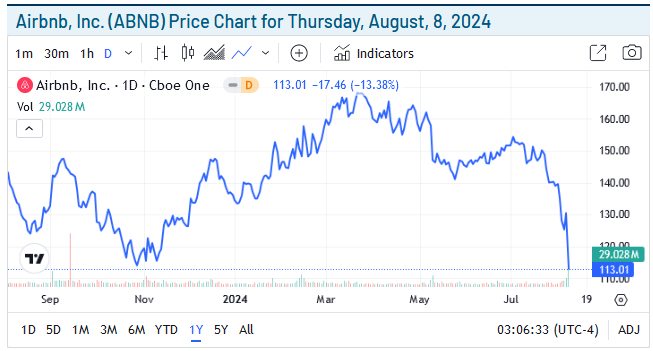- Airbnb stock is selling off by as much as 14% after reporting a solid quarterly report, disconnecting from fundamentals.
- The company’s drivers currently point to strong financial momentum, and it has no intention of stopping.
- Betting on a weaker dollar seems counterintuitive, but that’s where management is wrong about its current guidance.
The stock market has been on a whipsaw in the past few trading days. As the so-called “Carry Trade” is now unwound in Japan after that country’s central bank hiked interest rates, the bottom for the is now further away than most had initially thought. Of course, when markets sell-off, they don’t take any prisoners, and even stocks with strong fundamentals get dragged down.
One of these victims today is Airbnb. This stock plummeted 14% after the market closed on Tuesday, even after strong second-quarter 2024 earnings results.
As bearish as this price action may seem, it presents the perfect example for investors to consider giving Airbnb a second look, especially as the American tourism industry is about to rally on a weaker dollar ahead.
Though taking a weak dollar view might seem unpatriotic, none other than Warren Buffett has taken it, as Berkshire Hathaway reported to have sold half of its stake in Apple and also closed some of its position in Bank of America. But this doesn’t have to mean bad news for everyone, namely for Airbnb stock in the following quarters.
The Accelerating Forces Driving Airbnb Stock Upwards
When analyzing companies, key performance indicators (KPIs) play a crucial role in understanding their potential. For Airbnb, several drivers are propelling its growth:
Revenue growth of 11% over the past 12 months is a solid foundation. But the exciting news lies in its free cash flow, up by 16% to $1 billion, indicating a healthy 41% net income margin.
Gross Booking Value (GBV) rose by 11%, showcasing increased average daily rates. Users are willing to pay for the freedom Airbnb provides, evident in a 9% rise in net bookings.
Moreover, with a 25% annual increase in global app downloads, Airbnb’s user base is expanding, promising future monetization opportunities.
Investor Confidence in Airbnb’s Growth Trajectory
With a full year of positive free cash flow, Airbnb has initiated share repurchases, a tax-efficient way of rewarding shareholders. Analysts foresee up to 14.8% EPS growth in the coming year.
Benchmark predicts a price target of $190 per share, implying a 45.6% potential increase. Short sellers are also retreating, paving the way for bullish sentiment.
Despite global market volatility, Airbnb’s positive indicators are attracting investors, creating an optimistic outlook.
Dispelling Misconceptions Around Airbnb Stock
The recent sell-off post-earnings can be attributed to management’s cautious future outlook. A projected decline in U.S. guests led to a double-digit drop.
However, as the dollar weakens, overseas tourists are expected to flock to U.S. destinations, benefitting Airbnb’s global reach and popularity.
Unlike competitors, Airbnb commands a price-to-sales premium, reflecting its unique position in the market and justifying its valuation.


